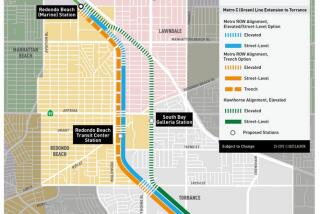City Holds Out for Pipeline Concessions : Safety: Among issues being negotiated with Mobil is a cap on volume of oil to be pumped.
CULVER CITY — Sometimes it pays to be last.
Culver City is the only community along the path of a 95-mile Mobil Oil Corp. pipeline project that has not approved the $88-million job. City officials say this gives them additional leverage in negotiations with the oil company.
Mobil is replacing an aging pipeline stretching from oil fields in Kern County to its refinery in Torrance with a new 16-inch line that will carry an average of 95,000 gallons of crude oil a day, 50% more than the current one.
Torrance, Hawthorne, Inglewood and Los Angeles, several county governments and the U.S. Forest Service have already awarded franchise agreements to Mobil to operate and maintain the pipeline through their jurisdictions.
“I think we’re the ones giving this the most scrutiny,” said Culver City Councilman Steven Gourley. “Somehow, we’ve become the guardians of safety for the entire Los Angeles Basin.”
It took months of negotiations for the Culver City staff and Mobil Oil officials to agree on a franchise fee and a list of mitigation measures to be taken by Mobil. But so many questions were raised at a public hearing on Monday concerning safety and construction procedures that council members voted to continue the hearing Monday.
“We’re going to do everything we can to ensure the safety of (residents) before we approve anything,” said Mayor James Boulgarides.
The holdouts hope to win some extra concessions. They include: capping the volume of oil allowed through the pipeline and charging a fine for going over that limit, installing a flow meter that can be monitored by a city engineer, and establishing a Mobil-funded kitty to quickly pay for damage claims that may arise during construction.
Being the last city appears also to have helped Culver City win the best financial deal. The franchise fee of $64,139 a year in the tentative agreement with Mobil is more than $23,000 per mile more than any other city along the route.
Boulgarides called the amount “a pittance” compared with what is at stake and pledged not to rush through the process.
The new pipeline will enter Culver City at Venice and Sepulveda boulevards and run for 2.7 miles along Sepulveda, Sawtelle Boulevard and Segrell Way before crossing back into Los Angeles at Centinela Avenue.
Crude oil in the pipeline will be heated to 160 degrees to make it flow more easily. Three automatic shut-off valves in a three-mile stretch that includes Culver City will control leaks in an emergency. The nearest pipeline workers are based on Terminal Island.
Construction in the city would take six weeks, and would take place at night along busy streets and during the day in residential areas.
The public hearing Monday drew a contingent of pipeline opponents aware that this could be their last chance to affect the project. They warned Culver City of potential environmental disaster, citing a history of Mobil pipeline spills and accidents at the company’s Torrance refinery. Others spoke in more general terms, like bus rider John Walsh: “Gasoline is an auto addict’s heroin and this pipeline is like a gigantic syringe.”
Residents were concerned about what would happen in the event of an earthquake.
Ray Langlois, who lives 10 feet from the old pipeline on Segrell Way, said, “When they put that section in . . . it didn’t concern me too much. But when we had that last earthquake, I thought ‘My God. What if that thing erupted?’ ”
Mobil engineers say the new pipeline is designed to withstand an 8.0 magnitude quake.
Major sections of the pipeline have been laid despite a pending lawsuit. Filed by Coalition Against the Pipeline (CAP), the lawsuit charges that the project’s enviromental impact report is inadequate. A Superior Court judge upheld the environmental report in April, 1991, but the CAP appealed. A hearing is scheduled for later this month.
“We’re confident the superior court ruling will be upheld,” said David Novitsky, an attorney for Mobil.
More to Read
Sign up for Essential California
The most important California stories and recommendations in your inbox every morning.
You may occasionally receive promotional content from the Los Angeles Times.










